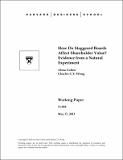| dc.contributor.author | Cohen, Alma | |
| dc.contributor.author | Wang, Changyi Chang-Yi | |
| dc.date.accessioned | 2016-09-20T16:37:55Z | |
| dc.date.issued | 2013 | |
| dc.identifier.citation | Cohen, Alma, and Charles C.Y. Wang. "How Do Staggered Boards Affect Shareholder Value? Evidence from a Natural Experiment." Journal of Financial Economics 110, no. 3 (December 2013): 627–641. | en_US |
| dc.identifier.issn | 0304-405X | en_US |
| dc.identifier.uri | http://nrs.harvard.edu/urn-3:HUL.InstRepos:28538428 | |
| dc.description.abstract | The well-established negative correlation between staggered boards (SBs) and firm value could be due to SBs leading to lower value or a reflection of low-value firms' greater propensity to maintain SBs. We analyze the causal question using a natural experiment involving two Delaware court rulings―separated by several weeks and going in opposite directions―that affected the antitakeover force of SBs. We contribute to the long-standing debate on staggered boards by documenting empirical evidence consistent with the market viewing SBs as leading to lower firm value for the affected firms. | en_US |
| dc.language.iso | en_US | en_US |
| dc.publisher | Elsevier | en_US |
| dc.relation.isversionof | http://www.sciencedirect.com/science/article/pii/S0304405X13002067 | en_US |
| dash.license | OAP | |
| dc.subject | governing and advisory boards | en_US |
| dc.title | How Do Staggered Boards Affect Shareholder Value? Evidence from a Natural Experiment | en_US |
| dc.type | Journal Article | en_US |
| dc.description.version | Author's Original | en_US |
| dc.relation.journal | Journal of Financial Economics | en_US |
| dash.depositing.author | Wang, Changyi Chang-Yi | |
| dc.date.available | 2016-09-20T16:37:55Z | |
| dash.contributor.affiliated | Cohen, Alma | |
| dash.contributor.affiliated | Wang, Charles | |


